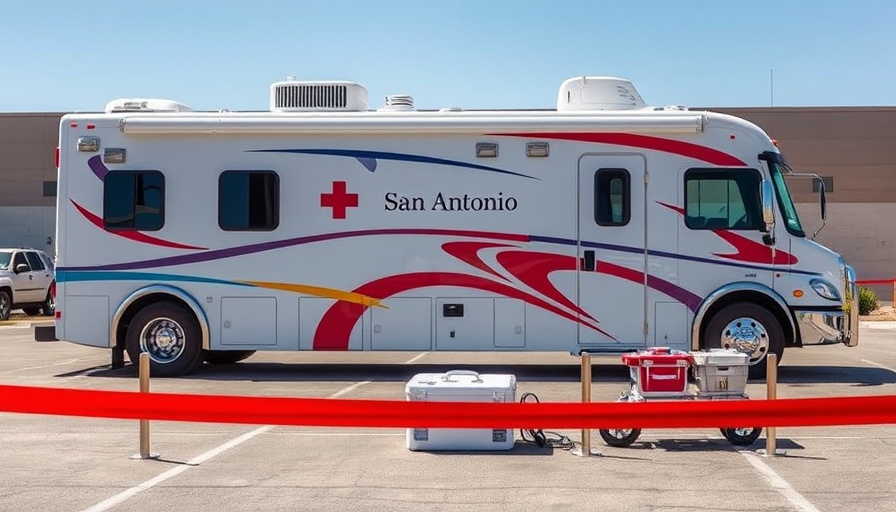
Bringing Medical Care to the Streets: San Antonio's Innovative Mobile Health Unit
In a groundbreaking initiative, Corazon Ministries has unveiled a new mobile medical unit that aims to provide essential health services to the most vulnerable populations in San Antonio. This initiative is not just about delivering healthcare; it is a lifeline designed to meet individuals in their time of need, especially for those experiencing homelessness. The mobile unit, expected to roll out in April, represents a significant step toward making healthcare accessible to everyone, regardless of their living situation.
Understanding the Needs of the Unsheltered
San Antonio currently faces significant challenges regarding its unsheltered population, estimated at over 3,000 individuals. Many of them are in dire need of medical attention, yet traditional healthcare facilities often seem out of reach. The experiences of individuals like John and Kim, who reported feeling lost and without support, highlight the urgent need for intervention. John expressed his relief about the mobile unit, stating, "It’s very hard. I don’t have nobody to turn to. I have no family." This echoes a common sentiment among those experiencing homelessness: a need for accessible healthcare that meets them where they are.
The Role of Community Collaborations
Funding for this innovative vehicle came not only from the First Day Foundation but also through collaborations with the City of San Antonio and Centro San Antonio. Such partnerships enhance the effectiveness of mobile healthcare initiatives by pooling resources and expertise. Jennifer Potter, vice president at UT Health San Antonio, emphasizes that these partnerships reflect a community-wide commitment to improving health outcomes for the homeless population. By bringing healthcare directly to those in need, it is possible to prevent unnecessary hospital visits, thereby saving lives and reducing the burden on local emergency services.
Potential Impact of the Mobile Medical Unit
The potential impact of this initiative extends far beyond immediate medical care. As Potter notes, addressing healthcare needs early can prevent complex health problems from developing. A proactive approach may prevent EMS transports, hospitalizations, and, crucially, loss of life. This is a significant shift in the healthcare paradigm, where waiting for patients to come to clinics often results in delayed or inadequate care.
Future Predictions: Expanding Access to Healthcare
The mobile unit is set to cover 45 monthly encampments, operating six days a week—a commitment that stands to change the health landscape of San Antonio. Local health authorities predict that as more people engage with these services, overall community health will improve. By lowering barriers to access, San Antonio can expect to see a decrease in emergency health incidents associated with untreated conditions.
Emotional and Human Interest Stories
Community members' stories humanize the issue of homelessness and healthcare access. As Kim pointed out, "Homeless people need medical attention. They can’t get to the hospitals. They need someone that can come to them." This poignant acknowledgment underscores the collective responsibility we have towards our most vulnerable neighbors. Sharing these personal experiences can foster greater empathy within the community and galvanize support for initiatives like the mobile medical unit.
Conclusion: A Call to Action
As the mobile medical unit prepares to hit the streets this April, community involvement is crucial. Support for this initiative can take many forms—volunteering, donations, and advocacy can all help sustain this vital service. We all share the responsibility of ensuring that everyone in our community has access to the healthcare they deserve. As Erika Borrego, CEO of Corazon Ministries, aptly stated, "We’re going to save lives and keep people out of hospitals." It’s now up to us to make this vision a reality.
 Add Element
Add Element  Add Row
Add Row 



 Add Row
Add Row  Add
Add 


Write A Comment